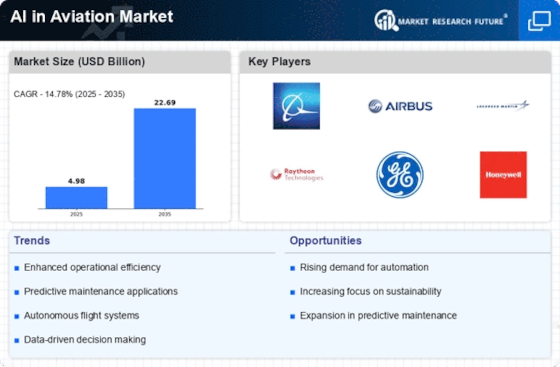Top Industry Leaders in the AI In Aviation Market
Competitive Landscape of AI in Aviation Market
The aviation industry, synonymous with precision and efficiency, is embracing a new level of intelligence: Artificial Intelligence (AI). From optimizing flight paths to predicting maintenance needs, AI promises to revolutionize every aspect of air travel. Has attracted a diverse range of players vying for dominance. Let's explore the competitive landscape, key players, and strategies shaping this transformative journey.
Key Players:
Intel CorporationGarmin Ltd.IBM CorporationAirbus SEBoeingGeneral ElectricAmazonMicrosoft CorporationNVIDIA CorporationNeurala Inc.Samsung ElectronicsMicron TechnologyXilinxThales S.A.Lockheed Martin CorporationNorthrop Grumman CorporationPilot AI LabsIRIS AutomationInnovative BinariesCognitive CodeSearidge Technologies.
Strategies for Air Supremacy:
- Specialization: Companies are focusing on specific segments like flight operations, predictive maintenance, or passenger experience. This targeted approach allows for deeper expertise and faster innovation.
- Partnerships and Acquisitions: Collaboration is key, with established players partnering with startups or other tech giants to combine resources and expertise. Acquisitions are also fueling market consolidation, as larger companies seek to broaden their AI offerings.
- Data is King: Access to and analysis of vast amounts of operational data is crucial for training effective AI models. Companies are investing heavily in data infrastructure and analytics capabilities to gain a competitive edge.
Market Share Analysis: Beyond Just Numbers:
- Technology Leadership: Companies with cutting-edge AI solutions and a strong track record of successful implementations will attract airlines seeking the latest advancements.
- Customer Relationships: Building trust and long-term partnerships with airlines is vital. Demonstrating the tangible benefits of AI in terms of cost savings, operational efficiency, and improved passenger experience will secure market share.
- Regulatory Landscape: Navigating the evolving regulatory landscape around data privacy and safety is crucial. Companies that stay ahead of the curve and ensure compliance will have an advantage.
New Frontiers and Emerging Players:
- Urban Air Mobility (UAM): The rise of electric Vertical Take-Off and Landing (eVTOL) aircraft requires robust AI-powered airspace management and safety systems. Companies like Joby Aviation and Volocopter are investing heavily in this space.
- Sustainable Aviation: AI can optimize flight routes and engine performance to reduce fuel consumption and emissions. Airlines and startups like Airbus's Airspace are leveraging AI for greener skies.
- Personalized Travel: AI-powered chatbots and travel assistants are creating a more customized and seamless passenger experience. Companies like AirHelp and SITA are building AI solutions to personalize bookings, handle disruptions, and improve overall travel satisfaction.
Investment Trends: Soaring High or Hitting Turbulence?
- VC Funding: Venture capital investment in AI for aviation is on the rise, with startups like Skywise and Aireon attracting millions in funding. This indicates growing investor confidence in the market's potential.
- M&A Activity: Mergers and acquisitions are consolidating the market, with larger players acquiring smaller companies with specific AI expertise. This trend is likely to continue as companies seek to broaden their offerings and gain market share.
- Internal R&D: Established aviation players are pouring resources into internal R&D, developing their own AI capabilities. This indicates a long-term commitment to AI integration within the industry.
Latest Company Updates:
Dec 20, 2023: Airbus joins forces with Dutch eVTOL developer PAL-V to integrate its Skywise AI platform for flight optimization and predictive maintenance, aiming to create a seamless air taxi experience.
Dec 12, 2023: Boeing and GE Aviation collaborate on a pilot program utilizing AI to optimize flight paths and engine performance, potentially reducing fuel consumption by 1.5%.
Dec 5, 2023: SITA introduces its "Smart Gate Plus" solution powered by AI for faster and smoother passenger processing at airports, offering automated facial recognition and document verification.
Dec 1, 2023: Japan Airlines announces its adoption of IBM Maximo Asset Management software, leveraging AI and analytics to predict potential aircraft maintenance issues and prevent disruptions.
Jan 6, 2024: AirMap, a leading provider of airspace management solutions for drones, raises $40 million in Series C funding to expand its AI-powered platform and support the growing urban air mobility market.
Beta feature











